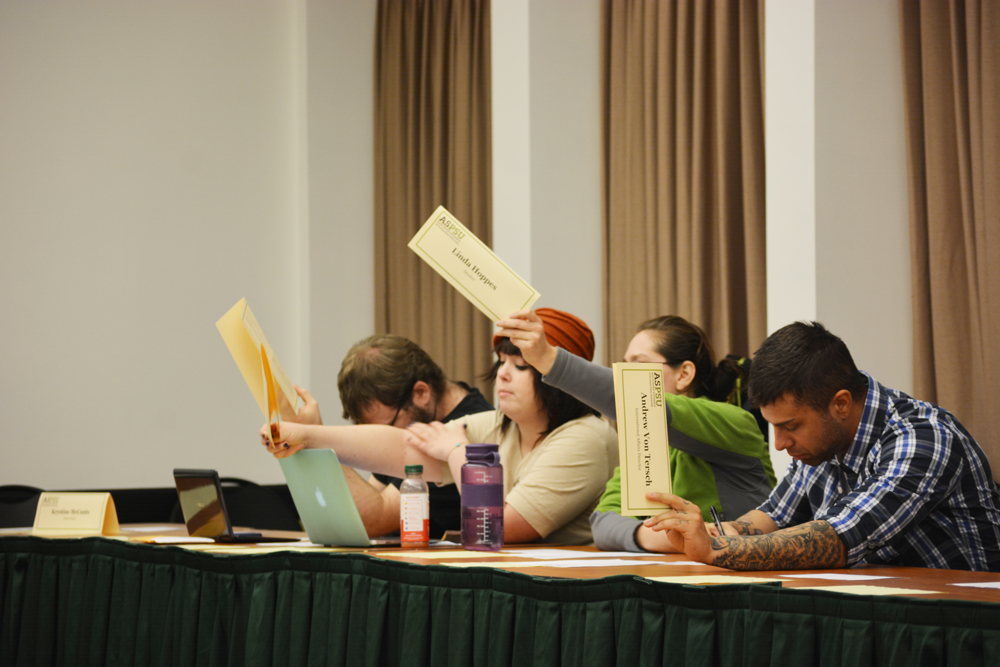On Monday, Jan. 12 the Associated Students of Portland State University met in Smith Memorial Student Union for the first ASPSU Senate meeting of winter term. The meeting’s agenda included a State of the Association address from ASPSU President Eric Noll and a review of the Student Fee Committee’s budget allocations.
After the reviewing budget allocations, voting members of the Senate passed a motion to refer back to the SFC with the recommendation of considering a $2–5 increase in the student fee, with focuses on diversity and retention efforts in the student fee allocation.
State of association
Noll began his address by recognizing the hardships and achievements over the last seven months and plans for the coming five months of this ASPSU term.
“We weren’t without victory, we weren’t without success and we weren’t without accomplishment,” Noll said.
Since taking office on June 2, 2014, ASPSU has faced many rifts and contention over a controversial election process, but Noll said they were able to improve relations throughout the year.
“Throughout the summer term and during the fall term we had the opportunity to really work with our organization and with each other to bring in new members to the organization and to accomplish…quite a bit we should be proud of,” Noll said.
Some achievements highlighted by Noll included: improving the ASPSU budget in under a month; passing amendments to six governing documents; appointing a member to the Board of Trustees; registering nearly 4,000 students to vote during fall term bringing the total to nearly 8,000 students in a year alone; enabling students the right to work under specific allocations in a joint effort with administration; and passing the social justice and cultural competency resolutions.
In addition, Noll mentioned the building of valuable relationships with the administration, alumni and Board of Trustees; he said these relationships put ASPSU in a position to accomplish their goals and to continue building on that success for the next couple of years.
Noll also focused on the remaining five months in this year’s student government term. He stressed the importance of full commitment from ASPSU members.
“To be quite honest, this term and the next term, they’re going to test us,” Noll said.
Noll provided each senate member with a piece of paper on which he asked them to respond to several questions throughout his address. These questions covered projections about achievements over the coming months, campus safety, and cultural competency.
“I do want to make this very clear,” Noll said. “[I] ask that if you plan…not to participate fully [in ASPSU] to the best of your ability, then I ask then that you use this paper this evening to pen your letter of resignation if you aren’t willing to commit to the next five months.”
Noll’s targeted goals for the remaining months include issues surrounding the current PSU payment plan.
“A lot of questions have been raised about it recently because it is something that is quite a drastic change in the way our financial aid is distributed,” Noll said.
Noll said the payment plan presents issues and risks for out-of-state and international students who depend on visas, and that ASPSU will work with the finance and administration department to address the concerns over the next few weeks.
He mentioned that ASPSU would be hearing recommendations for the increase of tuition for the next fiscal year.
“A lot of our work will depend on the reinvestment [in] education we receive from the state legislature. But without a state investment we can expect a 5 percent increase of student tuition on campus,” Noll said.
In addition to these matters, Noll spoke about increasing engagement with the Board of Trustees. Noll said he wants for ASPSU to find meaningful ways to change curriculum; improve sexual assault prevention; make a module through the Office of Global Diversity more mandatory; create additional policies by forming coalition partnership on campus; and continue to fight for the restoration of funding to higher education, community colleges and universities.
With election season approaching, ASPSU is also presented with an opportunity to transform the election system to better suit the needs of the students on campus.
Elections will be held mid-April, which Noll said allows for a smoother transition than previous years.
“I promise you, it’s not going to be like last year,” Noll said.
Noll also mentioned that ASPSU currently has three openings: two senate positions and the Student Life Director position, previously occupied by Jawan Mullen Jr.
Noll outlined three components that will increasingly speak to the transitions and changes ahead. These include ASPSU’s intention to improve student leadership; the creation of a template on past policies and service as a reference for others to use in the future; and the re-establishment of institutional memory—not through spending and phone calls, but through the way ASPSU concludes this year.
Noll’s final question to ASPSU members was, “What is the one thing that you’ll do in these next five months that you’ll want to be remembered for?”
“We choose to take on difficult issues and we choose to represent the student body. And even though we may not have the first clue on where we’re going to start, we still chose to be here,” Noll said.
He wrote the number 139 on the board. He explained that the number signified the remaining days they have left in ASPSU.
“I just ask that over the last five months—and I know it’s going to be exhausting—but you give it everything you have, stay passionate about this work and leave ASPSU on the 31st of May with fond memories,” Noll concluded.
SFC budget allocations
Noll pointed to ASPSU’s ability to respond to a signifigant amount of turnover at the beginning of the term in June 2014 as another point of pride.
“Probably one of our greatest achievements this year, that will really fly under the radar around campus but should be recognized here, is the work of the Student Fee Committee,” Noll said.
While the SFC’s budget is usually due in April, the Board’s quarterly schedule necessitated a condensed timeline, adding pressure to the SFC. Noll then turned the meeting over to SFC Chair Alexandra Calloway-Nation.
Calloway-Nation presented an overview of the student fee allocation process. The Senate is tasked with approving the SFC’s final budget allocation before it is due to PSU President Wim Wiewel on Feb. 3. After Wiewel’s review and approval, the budget will be presented to the PSU Board of Trustees for review on Feb 12.
SFC anticipates a final allocation of $14,678,855 for the 2016 fiscal year.
Calloway-Nation began by addressing what was new this year, including timeline changes, Cost of Living Adjustment additions to the budget, and a shift in enrollment that is anticipated to lead to a decrease in revenue.
The SFC presentation included a recommendation from the committee not to raise the student incidental fee, which funds student programs and services intended to enrich cultural and physical development for PSU students. The fee is currently set at $218 per term. Last year the SFC raised the fee by $2.
In addition, Calloway-Nation addressed the three main student fee funding recipients. Educational, cultural and student government activivites and clubs recieved the most funding, followed by athletic activities. The SFC recommended a 6 percent decrease in athletics funding for the 2016 fiscal year. SMSU was third, with the addition of COLA increases. For this, the committee anticipates a static allocation between this year and next.
Calloway-Nation noted the SFC’s emphasis on supporting student workers.
“We really wanted to support student workers, because for many students without a job they wouldn’t be able to go to PSU, especially if this job wasn’t on campus—near classes,” Calloway-Nation said. “This is especially the case for many international students who are by law only allowed to work on campus. So this is something we really worked to preserve in almost all fee-funded areas with student worker positions.”
In addition, she mentioned a focus on preventative maintenance, citing SMSU as an example.
“[SMSU] is just one example of us taking initiative with preventative maintenance,” Calloway-Nation said.
“We had overall cuts that affected almost all fee-funded areas. These two overall cuts were to travel and hosting,” Calloway-Nation said.
She added that the SFC cut hosting funds for almost every area, unless it was deemed essential to the group’s mission.
Some final factors the SFC has taken into consideration are the student fee’s impact on the student experience, revenue generation and financial sustainability.
“We also invested in office positions, cultural centers, and resource centers,” Calloway-Nation said.
After Calloway-Nation’s presentation, members of the Senate discussed a motion to maintain the student fee at its current rate, as per the SFC’s recommendation.
Senate Discussions
In lieu of being able to reach a final decision on whether or not to maintain the current student fee, the Senate passed a motion made by Noll to refer the budget back to the SFC for an example of what a fee increase might look like. He recommended an emphasis on diversity and retention programs.
Before discussion began, Senate Chair Galen Russell reminded Senators of their roles in the allocation process.
“It’s not the Senate’s role to be the SFC,” Russell said. “It’s SFC members’ role to be the SFC. It’s not our job to micromanage the process. It’s our job to discuss the process and to bring things to SFC’s attention…and also to approve any changes in the student fee…So I ask that you not take on roles that aren’t actually yours tonight.”
Members of the Senate and executive board questioned the SFC about their reasons for choosing not to raise the fee.
ASPSU Vice President Rayleen McMillan asked the SFC if they had already worked out budget scenarios with increased fees and increased funding.
“This is our budget, these are our colleagues who put their blood, sweat and tears into this process, and that process needs to be respected,” McMillan said.
Patrick Vroman, an ASPSU Senator, said he supported the recommendation to keep the student fee at its current rate.
“I’ll add to the side speaking against an increase,” Vroman said. “[I]f it’s feasible to avoid increasing the fee, I think we should try not to increase.”
Senator Melinda Joy asked the SFC what kind of measures are in place to hold student-fee funded groups accountable for spending throughout the year.
Dean of Student Life Michelle Toppe was in the audience, and commented on the history of the SFC’s budget allocation process and procedures that contribute to accountability.
“What this year’s fee committee inherited was a pretty efficient process…particularly around accountability,” Toppe said. “In the last several years, the fee committee has instituted a process called quarterly reports.”
Toppe said these reports help track fee-funded group spending and ensure the allocations are being use in the way the budget intended.
“There was a period of time when that didn’t happen,” Toppe said. “It was unfortunate, because students were paying a fee and then at the end of the year there was bunch of money left over because it didn’t get used in the manner it had been asked to be used.”
Multicultural Affairs director Tony Funchess asked if the SFC had created a sample budget allocation that showed what the student fee would look like if each fee-funded group received all of the funding it had requested.
“What would the increase look like if you were to have fully-funded all of these requests? Do we know what that number is?” Funchess asked.
Toppe said Funchess’ request made sense. “This [also] means not making a cut to athletics…What would that amount be?”
Noll discussed the function of the student fee and explained why an increase might be important for the student experience.
“The student fee historically has been a place where students have decided to pay for services that go directly back to them—resource centers, student government, and other programs that fund student activities on campus,” Noll said.
“It’s been one of the places that students have funded a lot of retention programs, a lot of programs that have benefited students who identify with communities that are traditionally underrepresented and marginalized,” he said.
Noll explained that PSU often does not see these types of programs and resources as strategic investments.
“It’s important for us to look at the value of increasing the student fee beyond just increasing the cost to students,” Noll said.
The SFC will complete the Senate’s request for a sample budget this week and present it at the next Senate meeting on Jan. 26. The Senate will need to pass the budget at the next meeting in order to meet the SFC’s deadline to present the final allocations to President Wim Wiewel on Feb. 3.






